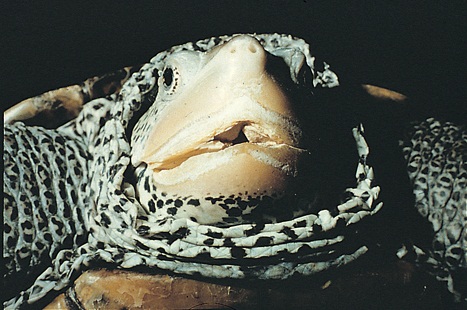Difference between revisions of "Reptiles and Amphibians Q&A 18"
Ggaitskell (talk | contribs) |
|||
| Line 11: | Line 11: | ||
|a1= | |a1= | ||
Malocclusion due to the accumulation of keratinous debris. | Malocclusion due to the accumulation of keratinous debris. | ||
| − | |l1= | + | |l1=Beak Overgrowth - Chelonia |
|q2=How would you treat this condition? | |q2=How would you treat this condition? | ||
|a2= | |a2= | ||
With only manual restraint being necessary, hold the terrapin’s mouth open and, using a small dental instrument, remove the accumulated debris. These deposits lift away easily from the subjacent normal oral tissues. | With only manual restraint being necessary, hold the terrapin’s mouth open and, using a small dental instrument, remove the accumulated debris. These deposits lift away easily from the subjacent normal oral tissues. | ||
| − | |l2= | + | |l2=Beak Overgrowth - Chelonia#Treatment |
|q3=What measures can be taken to prevent this condition from recurring? | |q3=What measures can be taken to prevent this condition from recurring? | ||
|a3= | |a3= | ||
| Line 23: | Line 23: | ||
The diet fed to captive chelonians should include food items that are mildly abrasive – small periwinkle-type marine snails and/or dry commercial turtle or trout chow are suitable for this purpose. | The diet fed to captive chelonians should include food items that are mildly abrasive – small periwinkle-type marine snails and/or dry commercial turtle or trout chow are suitable for this purpose. | ||
| − | |l3= | + | |l3=Beak Overgrowth - Chelonia#Prevention |
</FlashCard> | </FlashCard> | ||
Revision as of 14:48, 28 October 2011
This diamondback terrapin has a disorder involving its mouth parts.
| Question | Answer | Article | |
| What is your diagnosis? | Malocclusion due to the accumulation of keratinous debris. |
Link to Article | |
| How would you treat this condition? | With only manual restraint being necessary, hold the terrapin’s mouth open and, using a small dental instrument, remove the accumulated debris. These deposits lift away easily from the subjacent normal oral tissues. |
Link to Article | |
| What measures can be taken to prevent this condition from recurring? | In their natural habitat, the diet of these terrapins consists mainly of small marine molluscs, such as periwinkles and other snail-like shelled invertebrates. When these molluscs are consumed, their hard shells abrade the terrapins’ oral tissues, thus keeping them free of excessive keratin debris. The diet fed to captive chelonians should include food items that are mildly abrasive – small periwinkle-type marine snails and/or dry commercial turtle or trout chow are suitable for this purpose. |
Link to Article | |
